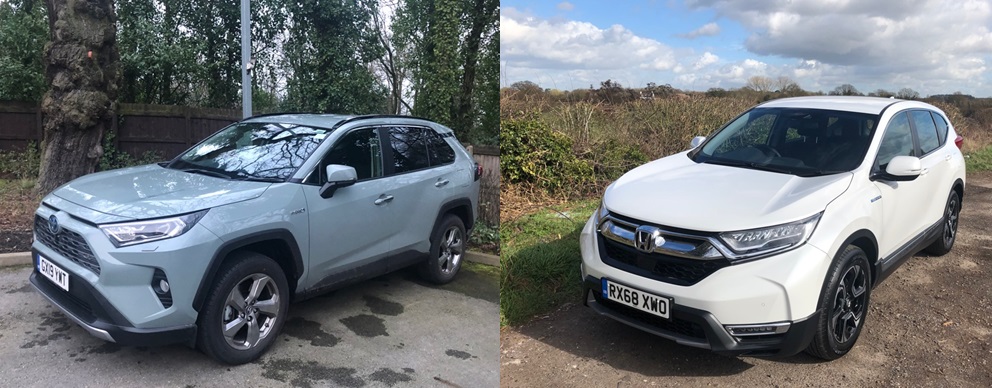High up, more space, blah, blah. I’m sure we all know the whys and wherefores for choosing an SUV over a saloon/hatch/wagon.
However, it needs to be efficient (BIK tax and/or fuel costs) and not diesel – for any number of reasons.
If your brew of choice is the new Toyota RAV4 then it is just as well that you don’t favour diesel – as there isn’t one on offer. Toyota have stuck to their guns with hybrid – now is the time it seems to be paying off.
Right up against the RAV4 is the also new Honda CR-V hybrid. They know a good idea too – they’re not offering a diesel either.
But don’t go thinking these two titans are exactly the same. Oh no.
Common to both
- SUV bodystyle
- 4 cylinder petrol engine
- Automatic gearbox
- Battery pack
- Electric motor or possibly two if you choose 4WD
So where is the difference? – that seems to be everything.
How the electric motor is used, is the answer. In the Toyota, it is as it has always been – the primary power is the petrol engine and the electric motor powered by the battery helps out when it can.
The Honda is sort of back to front comparatively. The electric motor is the primary source of power again powered by the battery, but when the engine swings in, it acts as a generator to provide charge to the battery. Only at high loads/speeds does the gearbox lock into the engine to allow it to directly drive the wheels.
That’s all lovely (I hear you say) but what difference does that make?
Having driven both, but in different circumstances, there is an obvious answer and a hard answer.
The obvious answer is the Honda is quieter and more serene more often particularly as the engine doesn’t rev as normal thanks to it only being a generator much of the time.
The hard answer is efficiency/emissions. It would seem a reasonable assumption that the MPG/CO2 ratings would favour the Honda.
But no.
RAV4 2.5 VVT-i Hybrid Design 5dr CVT 2WD
- CO2 – 105g/km (NEDC correlated)
- MPG – 50.4 (WLTP combined)
CR-V 2.0 i-MMD Hybrid SE 2WD 5dr eCVT
- CO2 – 120g/km
- MPG – 40.9 (WLTP combined)
Unfortunately, it needs someone much cleverer than me to explain this away. All I will say is my experiences of the two cars would lead me to think that if you do more urban driving, this may favour the Honda – more high power longer journeys, over to the Toyota.
I drove a mainly gentle 25 mile route in the Honda, the bulk B road but including some A road and dual carriageway. I was trying to be efficient, but not overly so.
Average MPG, nearly bang on 60. Decent.
The Toyota I used over a weekend in mixed urban use, without any journey longer than 10 miles or so. Repeated cold/warm starts.
Average MPG, around 43. Still decent and better than my 1.6 CRDi Kia Sportage that averages around 41 MPG.
Both cars, as you would expect are quiet, comfortable, spacious and well made.
A certain element of buyer’s choice will be style. The Toyota has a busier infotainment/dash setup, the Honda has the benefit of some wood inlays – different strokes for different folks, and all that.
The point of all this is that it is, and will continue to be very confusing for most people to make an informed choice. In fact, even those of us who are surrounded by it all the time (including me) find it a challenge to keep up with every development.
However, both of these cars – unless you do serious mileage – will happily replace a diesel without sacrificing efficiency. That’s a big tick for progress. Apart from the weight, but let’s not get picky.
Paul Titchmarsh – Director of Risk & Manufacturer Relations

